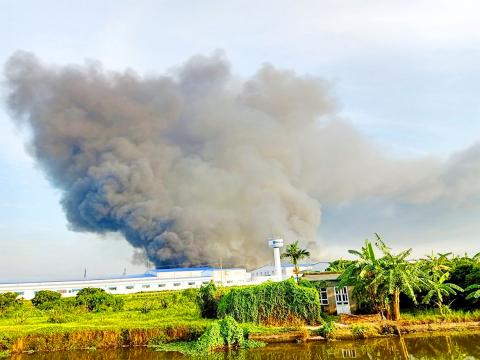Makalot Industrial Co Ltd (聚陽實業) yesterday said it would maintain its output from Vietnam by relocating workers, equipment and raw materials, after a fire broke out at two of the apparel maker’s plants in northern Vietnam early on Sunday.
“None of our workers were hurt and we are still evaluating the financial losses,” Makalot spokesperson Lin Heng-yu (林恆宇) said by telephone.
“Some orders for this month would be delayed to next month, but revenue for this year is not expected to be affected much,” he said.

Photo: CNA
The company said it has fire insurance for equipment and inventories at its Vietnamese plants.
Once it calculates its losses from the fire, it would file a claim with its insurers, Makalot said in a filing with the Taiwan Stock Exchange.
The blaze erupted at 4:45am in the workshop in the Thanh Ha commune of Hai Duong Province’s Thanh Ha District, and quickly spread due to flammable objects and the hot and dry weather, the Vietnam News Agency (VNA) reported on Sunday, citing the Hai Duong Police Department for Fire and Rescue.
The fire was put out in a few hours, but sewing machines and raw materials in the two plants were damaged, VNA reported.
The cause of the fire is under investigation, it said.
“The fire damaged our equipment and inventory, so we plan to redeploy about 1,000 employees and backup equipment to two nearby plants, once our clients agree,” Lin said.
Makalot has six plants in Vietnam.
“Raw material inventories have dropped to one week, but we have already placed new orders,” Lin said.
The two factories, which mainly produce low-end apparel for the US market, accounted for about 5 percent of the company’s annual output, or less than 750,000 dozens per year, Lin said.
The company does not expect orders for the second half of the year to be affected, he said.
“This is the high season for autumn and winter apparel, so none of our clients have wanted to withdraw orders,” Lin said.
The company will redo some of its orders through additional shifts at its four other plants, and outsource some orders, he said.
The two plants would be renovated within three months at the earliest, Lin said, without providing a time frame for the resumption of work.
Makalot shares yesterday closed down 0.53 percent at NT$196 in Taipei trading, compared with the broader market’s 0.66 percent rise.

NOT JUSTIFIED: The bank’s governor said there would only be a rate cut if inflation falls below 1.5% and economic conditions deteriorate, which have not been detected The central bank yesterday kept its key interest rates unchanged for a fifth consecutive quarter, aligning with market expectations, while slightly lowering its inflation outlook amid signs of cooling price pressures. The move came after the US Federal Reserve held rates steady overnight, despite pressure from US President Donald Trump to cut borrowing costs. Central bank board members unanimously voted to maintain the discount rate at 2 percent, the secured loan rate at 2.375 percent and the overnight lending rate at 4.25 percent. “We consider the policy decision appropriate, although it suggests tightening leaning after factoring in slackening inflation and stable GDP growth,”

DIVIDED VIEWS: Although the Fed agreed on holding rates steady, some officials see no rate cuts for this year, while 10 policymakers foresee two or more cuts There are a lot of unknowns about the outlook for the economy and interest rates, but US Federal Reserve Chair Jerome Powell signaled at least one thing seems certain: Higher prices are coming. Fed policymakers voted unanimously to hold interest rates steady at a range of 4.25 percent to 4.50 percent for a fourth straight meeting on Wednesday, as they await clarity on whether tariffs would leave a one-time or more lasting mark on inflation. Powell said it is still unclear how much of the bill would fall on the shoulders of consumers, but he expects to learn more about tariffs

Greek tourism student Katerina quit within a month of starting work at a five-star hotel in Halkidiki, one of the country’s top destinations, because she said conditions were so dire. Beyond the bad pay, the 22-year-old said that her working and living conditions were “miserable and unacceptable.” Millions holiday in Greece every year, but its vital tourism industry is finding it harder and harder to recruit Greeks to look after them. “I was asked to work in any department of the hotel where there was a need, from service to cleaning,” said Katerina, a tourism and marketing student, who would

i Gasoline and diesel prices at fuel stations are this week to rise NT$0.1 per liter, as tensions in the Middle East pushed crude oil prices higher last week, CPC Corp, Taiwan (台灣中油) and Formosa Petrochemical Corp (台塑石化) said yesterday. International crude oil prices last week rose for the third consecutive week due to an escalating conflict between Israel and Iran, as the market is concerned that the situation in the Middle East might affect crude oil supply, CPC and Formosa said in separate statements. Front-month Brent crude oil futures — the international oil benchmark — rose 3.75 percent to settle at US$77.01